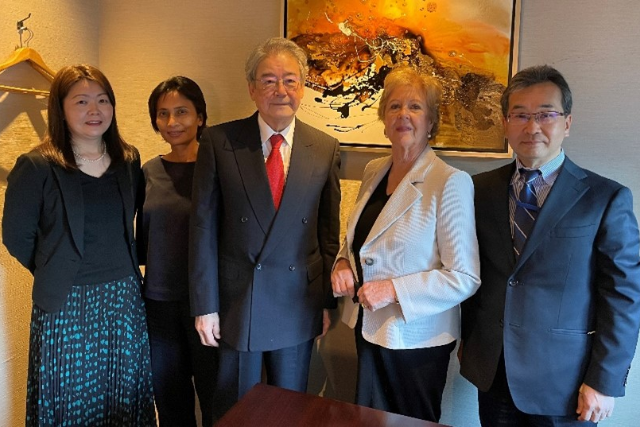Discussion with Ms.Gillian Triggs, UN Assistant Secretary-General/UNHCR Assistant High Commissioner for Protection

From left : Ms. Nacken, Deputy Representative of UNHCR Representation in Japan,
Ms. Monique Sokhan, Senior Protection Coodinator of the UNHCR Regional Bureau for Asia and the Pacific, Dr. Fujiwara, President of the FWEAP,
Ms. Gillian Triggs, UN Assistant Secretary-General/UNHCR Assistant High Commissioner for Protection,
Mr. Yoshida, Director-General of the RHQ
In the afternoon of December 19th, 2022, Dr. Fujiwara Masahiro, President of the FWEAP together with Mr. Yoshida Tomoyuki, the Director-General of the RHQ held a discussion with Ms. Gillian Triggs, UN Assistant Secretary-General/UNHCR Assistant High Commissioner for Protection who was visiting Japan. Dr. Fujiwara and Mr. Yoshida explained to Ms. Triggs and her party the detail of Japan’s refugee resettlement assistance provided by Japanese government and carried out by the RHQ under the FWEAP.
Ms. Monique Sokhan, Senior Protection Coordinator of the UNHCR Regional Bureau for Asia and the Pacific, Ms. Ritsu Nacken, Deputy Representative and Ms. Nami Asaka, Senior Protection Officer both from the UNHCR Representation in Japan participated in the discussion.
In the morning of the same day, Ms. Triggs and her party visited City of Chiba where they paid a call on City Mayor, Mr. Kamiya Shunichi. Then they also met with resettled refugees from Myanmar and convention refugees from Afghanistan as well as some Ukrainian evacuees residing in the city.
The RHQ Director-General Mr. Yoshida explained that the resettled refugee whom Ms. Triggs met in Chiba was in leadership position at his workplace and he maintained a stable lifestyle. Mr. Yoshida furthermore added that Afghan convention refugees were participating in “online” settlement support program organized by the RHQ since they lived in different cities in Japan including City of Chiba.
Ms. Triggs praised that Japan`s resettlement and settlement support program was conducted in integrated manner since it assisted not only Japanese language education and lifestyle guidance but also provided health care and job placement. She also appreciated the program`s consecutive follow-up support for daily lives and language learning after resettlement. Attentive to the details, she commented that all these supports provided in Japan were unparalleled by other countries.
Further the discussion, Dr. Fujiwara introduced the FWEAP`s original undertakings which aim to craft an inclusive society with foreign residents, based upon the fact that more than 12,000 refugees had settled in Japan since Japan started accepting Indochinese refugees. For that end, the FWEAP provides financial aid to the activities such as mutual self-assistance among foreign communities, human resource development of individuals to bridge Japanese and foreigners through the event of “Japanese language presentation contests”. It also includes the assistance to “supplementary classes” which would improve learning abilities of refugee children and students, emphasizing that the poor studying ability of refugee children, many of whom face difficulty to keep up with their schoolwork in Japan, is an urgent issue because it affects their future.
Ms. Triggs presented UNHCR ideas of unprecedented approach to refugee support such as education pathways and employment pathways. In response, Dr. Fujiwara elaborated that accepting foreign labor was expected as a solution to the labor shortage in this society and to this end the creation of multicultural inclusive society, by which refugees and other foreign nationals might be adapted into Japanese society without feeling discomfort, would be even more important in near future. He also expressed that the FWEAP and the RHQ would further collaborate with various stakeholders to ensure smooth implementation of Japanese government measures in accordance with directions of its refugee policies.
At the end of discussion, Ms. Triggs mentioned “the Global Refugee Forum 2023” to be held in Geneva and expressed her expectation for renewed contributions of Japanese government as one of co-chair countries, as well as those of non-government stakeholders like the FWEAP.






